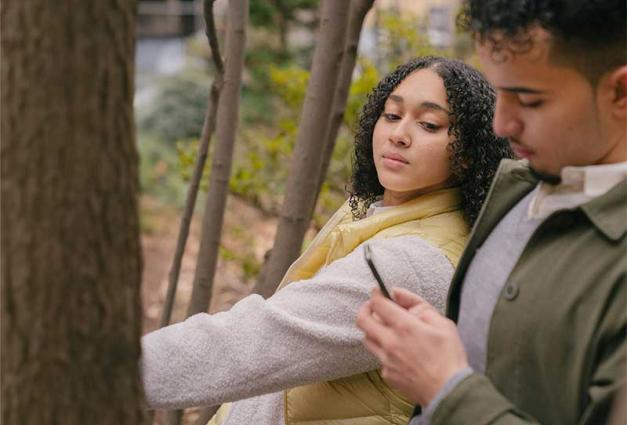Some relationships end. Or do they? Now that we use technology to document so many aspects of our lives, how do we move on from breakups when our pictures, videos, and text messaging conversations offer a constant reminder of what used to be?
When we were teenagers in the 1990s, our friends often engaged in the ritualistic tradition of having a bonfire when one of them experienced a breakup. All reminders of the ex-partner—Polaroid photographs, handwritten notes, journal entries—were tossed into the flames. Both a metaphor and a tool, the fire signaled the end of a relationship and allowed individuals to leave behind painful symbols of their previous relationship.
Now, our social lives have increasingly migrated into online spaces. We text message our friends, we Facetime our siblings, and we post photos to social media documenting and sharing our vacations. Each of us generates a massive amount of online data. In fact, over a trillion digital photos are taken each year! When you add it all up, we’re creating a lot of digital “stuff.”
This stuff is more than just computer code. It represents our memories. A text messaging conversation that you can reread years after it occurred provides a window into your life and mindset at a specific moment of your life. A video of you and your partner on vacation offers a crystal clear connection to emotions that would otherwise be difficult to recall. And, in the same way, we used to manage our photos, videos, and correspondence by creating photo albums, slideshows, scrapbooks, and journals, we must now organize these digital items.
This organization process can be fun, but it can also be incredibly difficult following the breakup of a romantic relationship. When our relationships end, we struggle to understand why. Did we do something wrong? Did we choose the wrong person? How can we explain the breakup to our friends and families? Digital remnants from our bygone relationship complicate this process because we are repeatedly confronted with reminders of the breakup.
Moreover, some people are simply nostalgic. Nostalgia is a sentimental longing for the past, and it’s not always a bad thing! In fact, nostalgic people tend to experience positive emotions and even higher self-esteem as they remember happy events from their past. However, feeling nostalgic may lead people to cling to digital items from their former relationship, which could hinder their ability to recover from a breakup.
We conducted a research study to understand whether it is better for people to keep or delete digital items that involve their previous relationships. Did people adjust better to the breakup when they kept these digital items or when they deleted them? We also wanted to find out whether people who were nostalgic were more likely to keep or delete digital possessions from their relationship and whether those keeping or deleting behaviors related to their adjustment to the breakup.
In surveying over 200 adults in the United States, we found that people who held onto digital items from their previous relationship struggled more to adjust to the end of their relationship. But some people found themselves keeping quite a few items while simultaneously deleting a trove of digital content. These individuals were also less adjusted. Moreover, people who were nostalgic reported being more likely to hold onto digital items, which in turn led them to adjust less well to the end of their relationship.
So after a breakup, what should people do with all of their Instagram photos, Snapchat memories, and text messaging conversations? Our research suggests people should consider a nuanced approach to managing these artifacts. In the same way that we often block out bad memories and cling to happy memories, people should consider deleting the especially painful digital reminders of their past relationships. On the other hand, clinging to every photo and conversation does not bode well for people trying to move on to new relationships.
Although the flame is metaphorical, digital bonfires offer the opportunity to purge past events. But to best prepare for your next relationship, our findings suggest it may be important to keep a few reminders of the good times and delete the rest (but don’t obsess over it).
For Further Reading
Brody, N., LeFebvre, L., & Blackburn, K. (2020). Holding on and letting go: Memory, nostalgia, and effects of virtual possession management practices on post-breakup adjustment. Journal of Social and Personal Relationships, 37, 2229-2249. https://doi.org/10.1177/0265407520921460
LeFebvre, L., Blackburn, K., & Brody, N. (2015). Navigating romantic relationships on Facebook: extending the relational dissolution model to social networking environments. Journal of Social and Personal Relationships, 32, 78-98. https://doi.org/10.1177/0265407514524848
LeFebvre, L., Brody N., & Blackburn, K. (in press). How concerns about former or future partners influence virtual possession management: Examining relational curation in the relational dissolution model. Communication Research Reports. Online before print. https://doi.org/10.1080/08824096.2020.1796617
Nicholas Brody is an Associate Professor in the Department of Communication Studies at the University of Puget Sound.
Leah LeFebvre is an Assistant Professor in the Department of Communication Studies at the University of Alabama.
Kate Blackburn is a post-doctoral research fellow in the Department of Psychology at the University of Texas at Austin.




